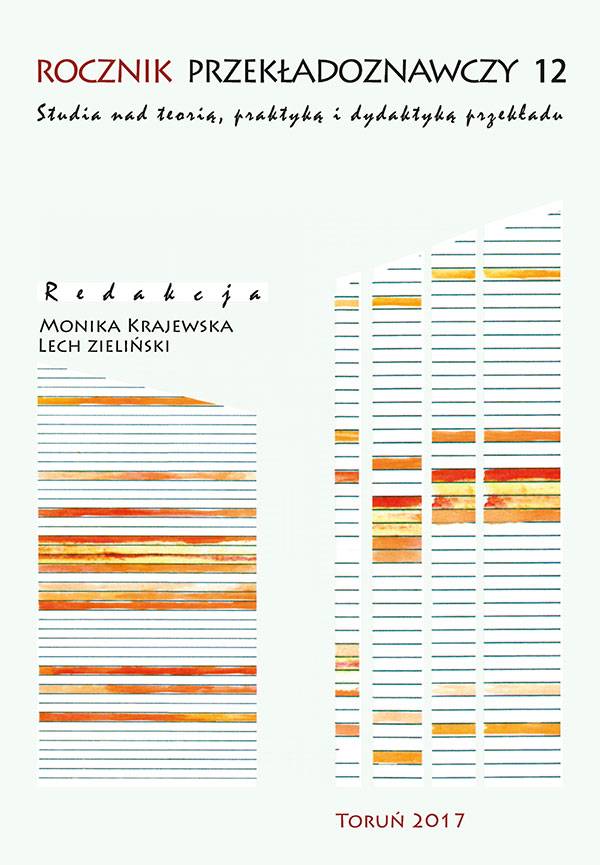Egzamin na tłumacza przysięgłego a realia wykonywania zawodu: głos krytyczny w sprawie weryfikowania kompetencji kandydatów na tłumacza przysięgłego
DOI:
https://doi.org/10.12775/RP.2017.002Słowa kluczowe
tłumacz przysięgły, egzamin pisemny, egzamin ustny, kompetencje tłumacza przysięgłego, realizm zawodowy, kryteria ocenyAbstrakt
Artykuł jest próbą krytycznej oceny części pisemnej egzaminu w świetle realiów wykonywania zawodu. Ocenie zostaną poddane szczególnie następujące elementy: kryteria oceny, w tym niska waga kryterium zgodności treści oraz brak kryterium błędu krytycznego, zakaz korzystania z materiałów pomocniczych (leksykonów, tekstów ustaw) i ograniczona możliwość korzystania ze słowników, brak dostępu do Internetu oraz konieczność odręcznego pisania podczas egzaminu. Elementy te zostaną skorelowane z modelem EMT kompetencji tłumaczeniowych oraz realiami wykonywania zawodu. W ujęciu bardziej globalnym postuluje się rozdzielenie uprawnień na tłumaczenia pisemne i ustne oraz możliwość specjalizacji.
Bibliografia
Biel, Ł., 2011, „Professional Realism in the Legal Translation Classroom: Translation Competence and Translator Competence”, Meta. Translators’ Journal 56 (1), s. 162–178.
Biel, Ł., 2012, „Egzamin na tłumacza przysięgłego – zbiory testow egzaminacyjnych”, Comparative Legilinguistics. International Journal for Legal Communication 9/2012, s. 103–108.
Biel, Ł., 2014, Lost in the Eurofog: The Textual Fit of Translated Law, Frankfurt am Main.
Cieślik, B., 2014, Materiały pomocnicze na egzaminie na tłumacza przysięgłego, „Rocznik Przekładoznawczy. Studia nad teorią, praktyką i dydaktyką przekładu”, M. Krajewska, L. Zieliński (red.), nr 9, s. 89–99.
Cieślik, B., L. Laska, M. Rojewski (red.), 2010, Egzamin na tłumacza przysięgłego. Komentarz, teksty egzaminacyjne, dokumenty, Warszawa.
Dostatni, G., 2005, Komentarz do ustawy o zawodzie tłumacza przysięgłego, Warszawa.
Espinoza, J., 2015, „More than 300 different languages spoken in British schools, report says”, The Telegraph, 24.07.2015, http://www.telegraph.co.uk/education/educationnews/11761250/More-than-300-differentlanguages-spoken-in-British-schools-report-says.html (dostęp: 31 lipca 2015 r.).
Gambier, Y. (red.), 2009, „Competences for professional translators, experts in multilingual and multimedia communication”, http://ec.europa.eu/dgs/translation/programmes/emt/key_documents/emt_competences_translators_en.pdf (dostęp: 30 lipca 2015 r.).
Kierzkowska, D. (red.), 2011, Kodeks tłumacza przysięgłego z komentarzem, Warszawa.
Kubacki, A. D., 2012, Tłumaczenie poświadczone. Status, kształcenie, warsztat i odpowiedzialność tłumacza przysięgłego, Warszawa.
Kuźniak, M., 2013, Egzamin na tłumacza przysięgłego w praktyce. Język angielski. Analiza językowa, Warszawa.
Pym, A., 2015, „Translating as risk management”, Journal of Pragmatics 85, s. 67–80.
Rybińska, Z. (red.), 2011, Teksty egzaminacyjne dla kandydatów na tłumacza przysięgłego, Warszawa.
Scarpa, F., Orlando, D., 2017, „What it takes to do it right: an integrative EMT-based model for legal translation competence”, Journal of Specialised Translation 27, s. 21–42.
Pobrania
Opublikowane
Numer
Dział
Statystyki
Liczba wyświetleń i pobrań: 937
Liczba cytowań: 0



